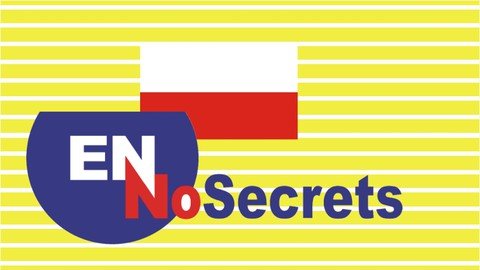
Free Download Let’S Speak Polish – Modal Verbs
Published 12/2023
MP4 | Video: h264, 1920×1080 | Audio: AAC, 44.1 KHz
Language: English | Size: 419.59 MB | Duration: 1h 23m
Differences between Polish and English modal verbs: can, must and should.
What you’ll learn
Verbs in Polish – Modal Verbs
The Polish Verb ‘móc, umieć, potrafić’ (can)
The Polish Verb ‘musieć’ (must)
The Polish Verb ‘powinno się’ (should)
Requirements
There are no requirements.
Description
This is the second part of the course ‘Polish Verbs vs English Verbs’ in the series ‘Polish almost without Secrets.’ The entire series is dedicated to the practical aspects of using various types of verbs and other parts of speech, as well as grammatical tenses in the Polish language.This course is focused on discussing the modal verbs ‘móc, umieć, potrafić’ (can), ‘musieć’ (must), and ‘powinno się’ (should) in the Polish languageIn Polish, the verb ‘móc / umić / potrafić’ (can), ‘musieć’ (must), and ‘powinno się’ (should) are inflected for all persons and numbers in the present, past, and future tenses for single and multiple events.Czas teraźniejszy (Present Simple):mogę / umiem / potrafię (I can),możesz, umiesz, potrafisz (you can),on // ona // ono może / umie / potrafi (he / she / it can),możemy / umiemy / potrafimy (we can),możecie / umiecie / potraficie (you can),oni // one mogą / umieją / potrafią (they can).Czas przeszły (Past Simple):musiałem (I had to),musiałeś (you had to),musiał / musiała / musiało (he/she/it had to),musieliśmy (we had to),musieliście (you had to),musieli / musiały (they had to).Czas przeszły (Future Simple):powinienem (I should),powinieneś (you should),powinien / powinna / powinno (he/she/it should),powinniśmy (we should),powinniście (you should),powinni / powinny (they should).In Polish, for all types of verbs: ‘być’ (to be), ‘mieć’ (to have), ‘czynności’ (actions), and ‘czasownik modalne’ ( modal verbs), negations, questions ‘czy’ (if), ‘czy nie’ (if not), questions about the subject, and questions about parts of the complement are formed in the same way, for example:I can be there now. – Mogę być tam teraz.I can’t be there now. – Nie mogę być tam teraz.Can I be there now? – Czy mogę być tam teraz?Can’t I be there now? – Czy nie mogę być tam teraz?Who can be there now? – Kto może być tam teraz?Who can’t be there now? – Kto nie może być tam teraz?Where can I be now? – Gdzie mogę być teraz?Where can’t I be now? – Gdzie nie mogę być teraz?Above, with numerous practical examples, is presented in Section 1 of this coursePolish Verbs vs English Verbs – Section IndexSection 1 Verbs in PolishSection 2 The Polish Verb ‘móc / umieć / potrafić’ (can) in Relation to Completed EventsSection 3 The Polish Verb ‘musieć’ (must) in Relation to Completed EventsSection 4 The Polish Verb ‘powinno się’ (should) in Relation to Completed EventsSection 5 Key to the Control Tests
Overview
Section 1: Polish Verbs vs English Verbs – Part II
Lecture 1 Polish Verbs
Lecture 2 Polish Verbs
Section 2: Polish Verbs vs English Verbs – Part II
Lecture 3 The Polish Verb ‘móc / umieć / potrafić’ (can) in Relation to Completed Events
Lecture 4 The Polish Verb ‘móc / umieć / potrafić’ (can) in Relation to Completed Events
Section 3: Polish Verbs vs English Verbs – Part II
Lecture 5 The Polish Verb ‘musieć’ (must) in Relation to Completed Events
Lecture 6 The Polish Verb ‘musieć’ (must) in Relation to Completed Events
Section 4: Polish Verbs vs English Verbs – Part II
Lecture 7 The Polish Verb ‘powinno się’ (should) in Relation to Completed Events
Lecture 8 The Polish Verb ‘powinno się’ (should) in Relation to Completed Events
Section 5: Polish Verbs vs English Verbs – Part II
Lecture 9 Key to the Control Tests
For anyone wishing to use Polish language.
Homepage
www.udemy.com/course/lets-speak-polish-modal-verbs/
qrarp.LetS.Speak.Polish..Modal.Verbs.rar.html
Uploadgig
qrarp.LetS.Speak.Polish..Modal.Verbs.rar
NitroFlare
qrarp.LetS.Speak.Polish..Modal.Verbs.rar
Fikper
qrarp.LetS.Speak.Polish..Modal.Verbs.rar.html










Leave a Reply
You must be logged in to post a comment.